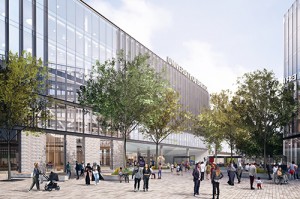The University of Bristol’s ambitious plans to create a new enterprise campus centred on world-class innovation next to Temple Meads railway station received a double boost this week.
The planned flagship Quantum Technologies Innovation Centre (QTIC), pictured – a key element of the £300m campus at Temple Quarter – received a £20m funding boost while city planners gave the green light to the university’s student accommodation element of the scheme. 
Plans to open the QTIC on the campus were announced two years ago when the university secured £14.97m in Local Growth Fund funding from the West of England Local Enterprise Partnership (LEP), administered by the West of England Combined Authority (WECA).
The additional £20m coming from WECA and will greatly extend its scope, helping to position the region as a global leader in deep tech innovation.
The extended facilities – to be called QTIC+ – will develop new businesses, products and services to explore emerging and new applications for quantum and other disruptive technologies, taking them out of the lab and into the commercial world.
QTIC+ will be the world’s first dedicated open access innovation centre facility for developing a broad spectrum of quantum technologies. It is expected to generate an estimated £232m of added economic value over ten years and will lead to 360 new jobs.
By bringing together researchers, businesses and communities with students, entrepreneurs and users of the technology under the same roof, the University will broaden the support for a wide range of disruptive technological approaches by lowering barriers to entry.
Experts predict that harnessing the quantum world – the behaviour of matter and energy on the atomic and subatomic level – will revolutionise technology by making it faster, smaller, more secure and, ultimately, more useful for a wide variety of applications.
University deputy vice-chancellor for new campus development, Prof Guy Orpen, said: “The new QTIC+ facility will further enable the region to become the go-to-place for development, commercialisation and growth of businesses.
“In Temple Quarter we will harness the advantages of quantum and other emergent technologies, such as artificial intelligence, human/computer interaction and novel computing architectures and their positive applications to real world scenarios.
“This will not only boost businesses and the economy, it has huge potential to benefit our everyday lives too.”
West of England Mayor Tim Bowles – who heads WECA – said the West of England’s innovation, ingenuity and creativity, alongside a highly-skilled workforce fed by its universities, ensured the region was a major force in the global marketplace.
“I am committed to ensuring our region is a driving force for clean growth that benefits all our residents, as set out in our Local Industrial Strategy, and to realise that ambition, we must continue to invest in innovation,” he said.
“Our investment in the Quantum Technologies Innovation Centre is part of a wider investment into the Temple Quarter Enterprise Zone, which, in addition to the £35m for QTIC, includes over £20m through the LEP’s Economic Development Fund to improve transport and pedestrian links, as well as significant investment into Temple Meads station including developing a new eastern entrance.”
The campus will also be home to the £100m Bristol Digital Futures Institute (BDFI), which will boast 6,000sqm of co-creation space, including a state-of-the-art interactive auditorium and the world’s first reality emulator to enable the study of future digital systems at scale.
The approved student accommodation to be built by the university at Temple Quarter will be home to 953 post-graduate students.
The accommodation will be in three buildings around a central courtyard on Temple Island. The university said student wellbeing and future flexibility were key themes in the design.
The ground floor will be metal clad to reflect the industrial heritage of the site and feature a 24-hour student hub along with commercial outlets while the upper floors include a large communal roof terrace, common rooms and a biodiversity roof, in addition to the living spaces. The facilities also include a gym and outdoor fitness spaces.
Prof Orpen said: “This decision represents an important stage in the evolution of our plans to develop a world-leading innovation campus in the heart of the city of Bristol.
“Our goal is to create high-quality spaces for the university community, visitors and for people in the city. The new campus is part of a wider regeneration of the Temple Quarter area that will help contribute to economic and social growth and enhance Bristol’s reputation as a global destination for innovation.”
The student accommodation, along with the QTIC and other new academic buildings, will replace the unloved Royal Mail sorting office building that stood on the site and was derelict for the past two decades.
In total the new campus will have space for 3,000 students, plus 800 staff, business and community partners.
Outline planning permission for the campus was granted in July last year.






























